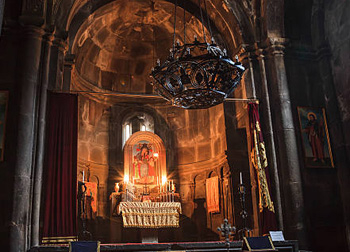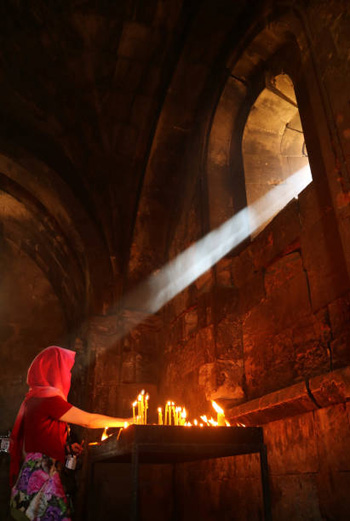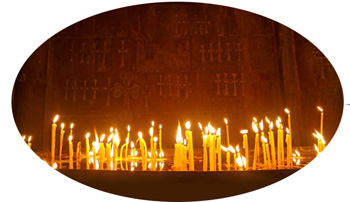Catholic Virtues
 |
 |
 |
 |
 |
 |
 |
True & False Paths to Happiness - XXXII
A God without Mysteries Would Not be God
From what we noted in the last article, we can see that the mystery is an amiable challenge, not an aggression. It prepares for Faith, and leads to the desire for an infinity that in fact can only be satisfied in Heaven.
 Can the quest for mystery, which so often results in self-worship or leads to superstition and the occult, generate healthy positions of soul? Without a doubt it can, and it can favor positions of great elevation in a framework radically opposed to the contemplation of oneself.
Can the quest for mystery, which so often results in self-worship or leads to superstition and the occult, generate healthy positions of soul? Without a doubt it can, and it can favor positions of great elevation in a framework radically opposed to the contemplation of oneself.
In fact, in the mystery is a paradox, since "the knowledge of not knowing" – in the words of St. John of the Cross – at the same time satisfies and awakens thirst.
A God without mysteries before His creatures would not be God. Religion requests a sense of mystery. The things of God both speak and remain silent. And it is not certain whether they say more by what they say or by about what they remain silent.
Someone might ask: "How can this be? How does one speak silently?" To speak silently is a paradox of the sort that led St. John of the Cross to contemplate "silent music" in another poem.
 In this way – through religion and the ladder of created things – we can thus ascend toward God. But, since He is infinite, there is a moment when we perceive the infinite distance that separates Him from us. It is then that we have the most lively, dynamic and exhilarating impression of the unimaginable, the inconceivable, the absolute.
In this way – through religion and the ladder of created things – we can thus ascend toward God. But, since He is infinite, there is a moment when we perceive the infinite distance that separates Him from us. It is then that we have the most lively, dynamic and exhilarating impression of the unimaginable, the inconceivable, the absolute.
Unimaginable and inconceivable. We can add the term ineffable, whose etymological origin – from the Latin ineffabilis or un-utterrable – indicates that which cannot be spoken.
Thus, we can understand why in certain Eastern liturgies at the time of the Consecration the veil is drawn, the curtains are closed separating the presbitery from the rest of the church. We only hear the priest say the holy words. This splendorous veil symbolizes that something ineffable is happening there.
The veil itself is not just a veil. It hides a mystery. Thus, we can ask whether the perception of the mystery does not complementt that zone of our soul that also has a prodigious capacity for understanding.
Our propensity to the sublime leads us to God
Being open to the marvelous or the sublime, is the first aspiration that the soul must have.
What does the sublime represent on the scale of beauty?
It is a degree of beauty superior to man and that leaves him overcome by something greater than himself. When a man's soul has a strong propensity to the sublime, his taste for the spiritual reality becomes more defined. Because the very idea of the existence of a Being who is not subject to the contingency of matter is sublime and more beautiful than all the beauties of matter.
An interaction operates here, for when we enter into the consideration of spiritual things, our tendency toward the sublime makes us understand something that matter does not allow us to understand.
Let us soar then to what is spiritual! To what is metaphysical, which in the etymological sense is what is beyond the physical. From the spiritual, we necessarily tend toward God, the most perfect and most pure Spirit. Considering Him completely enchants us; completely inspires us with adoration, veneration and trust. These are like hills that overlap one another until they touch on Faith in God.
The sense of mystery stems from our sense of contingency
The simple phrase "God created the world out of nothing" involves the notion of mystery, as do many other lines that, at first glance, may seem extremely simple.
 According to the most basic Thomistic philosophy, “creatures are neither necessary, nor uncaused, neither eternal nor infinite." Therefore, they are contingent: they owe their existence to something else. (Fr. E. Collin, Manual de Filosofía Tomista, Barcelona, 1950, p. 110)
According to the most basic Thomistic philosophy, “creatures are neither necessary, nor uncaused, neither eternal nor infinite." Therefore, they are contingent: they owe their existence to something else. (Fr. E. Collin, Manual de Filosofía Tomista, Barcelona, 1950, p. 110)
Our nature makes us constantly stumble on our limitations. For this reason the mystery frequently makes its presence felt.
It follows that man is left with a kind of backdrop of mystery in his head, a sense of mystery that every man carries in himself. It is a mystery that should not be seen as something contradictory to the nature of the contingent being, but as something that has a world of harmonies that the contingent being has a strong appetite to receive.
The existence of a hierarchy in creation also makes us encounter the mystery, because the one who is superior necessarily has aspects that the inferior does not fully understand.
Here we can develop and expand Fr. Henri Ramière's thesis on the planet / satellite relationship: Just as God created systems of planets and satellites in the material universe where various satellites orbit around a single planet, so also He desired that all creatures be hierarchically grouped according to their spiritual excellencies.
 Therefore, there are men-satellites who revolve around a superior man-planet, which is an element of beauty in the universe. It happens that the planet always represents a certain mystery for the satellite, a fact that the latter must accept and love. (Fr. Henri Ramière SJ (1821-1884), O Reino de Jesus Cristo na História, Porto: Livraria Civilização-Editora, 2001)
Therefore, there are men-satellites who revolve around a superior man-planet, which is an element of beauty in the universe. It happens that the planet always represents a certain mystery for the satellite, a fact that the latter must accept and love. (Fr. Henri Ramière SJ (1821-1884), O Reino de Jesus Cristo na História, Porto: Livraria Civilização-Editora, 2001)
The sense of mystery, then, stems from the notion of contingency, the sense of our limitations. Since our contingency and that of the whole Creation are irrefutable realities, mystery is an integral and indispensable element of reality. To reject the mystery is to flee from reality.
This being the case, man must become very aware of his contingency.
Being aware of one's contingency is that first ecstatic happiness a person feels to be very small in the face of the Immense; he does not want to be grand in comparison to God, and all his self-sufficiency is reduced to zero before God.
A culture without mystery becomes banal
Medieval man had a very high sense of mystery. The rupture with this sense of the mystery took place in the Renaissance, which clashed with the idea of transcendence. Italy of the 16th century broke with mystery, which can be seen in important churches that were built in Rome in that epoch. And a culture without mystery becomes banal.
Consequently, in the face of mystery, one must know how to say: “How marvelous! It is more than what I can understand!”
* * *
Transcending All Knowledge
From the Spiritual Canticle of St. John of the Cross
I entered into unknowing
Yet when I saw myself there
Without knowing where I was
I understood great things;
I shall not say what I felt
For I remained in unknowing,
Transcending all knowledge...
This knowledge in unknowing
Is so overwhelming
That wise men disputing
Can never overthrow it,
For their knowledge does not reach
To the understanding of not understanding,
Transcending all knowledge...
And this supreme knowledge
Is so exalted
That no power of man or learning
Can grasp it;
He who masters himself
Will, with knowledge in unknowing,
Always be transcending.
And if you should want to hear:
This highest knowledge lies
In the loftiest sense
In the essence of God;
This is a work of His mercy,
To leave one without understanding,
Transcending all knowledge.
(The Collected Works of St. John of the Cross,
trans. K. Kavanaugh & O. Rodriguez, 1964;
reprint, Washington, D.C.: ICS Publications, 1973, pp. 178-179)

Continued


A silence that speaks...
In fact, in the mystery is a paradox, since "the knowledge of not knowing" – in the words of St. John of the Cross – at the same time satisfies and awakens thirst.
A God without mysteries before His creatures would not be God. Religion requests a sense of mystery. The things of God both speak and remain silent. And it is not certain whether they say more by what they say or by about what they remain silent.
Someone might ask: "How can this be? How does one speak silently?" To speak silently is a paradox of the sort that led St. John of the Cross to contemplate "silent music" in another poem.

Curtains are drawn to veil the mystery of the Consecration at Geghard Monastery in Armenia
Unimaginable and inconceivable. We can add the term ineffable, whose etymological origin – from the Latin ineffabilis or un-utterrable – indicates that which cannot be spoken.
Thus, we can understand why in certain Eastern liturgies at the time of the Consecration the veil is drawn, the curtains are closed separating the presbitery from the rest of the church. We only hear the priest say the holy words. This splendorous veil symbolizes that something ineffable is happening there.
The veil itself is not just a veil. It hides a mystery. Thus, we can ask whether the perception of the mystery does not complementt that zone of our soul that also has a prodigious capacity for understanding.
Our propensity to the sublime leads us to God
Being open to the marvelous or the sublime, is the first aspiration that the soul must have.
What does the sublime represent on the scale of beauty?
It is a degree of beauty superior to man and that leaves him overcome by something greater than himself. When a man's soul has a strong propensity to the sublime, his taste for the spiritual reality becomes more defined. Because the very idea of the existence of a Being who is not subject to the contingency of matter is sublime and more beautiful than all the beauties of matter.
An interaction operates here, for when we enter into the consideration of spiritual things, our tendency toward the sublime makes us understand something that matter does not allow us to understand.
Let us soar then to what is spiritual! To what is metaphysical, which in the etymological sense is what is beyond the physical. From the spiritual, we necessarily tend toward God, the most perfect and most pure Spirit. Considering Him completely enchants us; completely inspires us with adoration, veneration and trust. These are like hills that overlap one another until they touch on Faith in God.
The sense of mystery stems from our sense of contingency
The simple phrase "God created the world out of nothing" involves the notion of mystery, as do many other lines that, at first glance, may seem extremely simple.

Men follow leaders like satellites orbit a planet
Our nature makes us constantly stumble on our limitations. For this reason the mystery frequently makes its presence felt.
It follows that man is left with a kind of backdrop of mystery in his head, a sense of mystery that every man carries in himself. It is a mystery that should not be seen as something contradictory to the nature of the contingent being, but as something that has a world of harmonies that the contingent being has a strong appetite to receive.
The existence of a hierarchy in creation also makes us encounter the mystery, because the one who is superior necessarily has aspects that the inferior does not fully understand.
Here we can develop and expand Fr. Henri Ramière's thesis on the planet / satellite relationship: Just as God created systems of planets and satellites in the material universe where various satellites orbit around a single planet, so also He desired that all creatures be hierarchically grouped according to their spiritual excellencies.

Man feels his contingency in the aura of mystery in an ancient Church
The sense of mystery, then, stems from the notion of contingency, the sense of our limitations. Since our contingency and that of the whole Creation are irrefutable realities, mystery is an integral and indispensable element of reality. To reject the mystery is to flee from reality.
This being the case, man must become very aware of his contingency.
Being aware of one's contingency is that first ecstatic happiness a person feels to be very small in the face of the Immense; he does not want to be grand in comparison to God, and all his self-sufficiency is reduced to zero before God.
A culture without mystery becomes banal
Medieval man had a very high sense of mystery. The rupture with this sense of the mystery took place in the Renaissance, which clashed with the idea of transcendence. Italy of the 16th century broke with mystery, which can be seen in important churches that were built in Rome in that epoch. And a culture without mystery becomes banal.
Consequently, in the face of mystery, one must know how to say: “How marvelous! It is more than what I can understand!”
Transcending All Knowledge
From the Spiritual Canticle of St. John of the Cross
I entered into unknowing
Yet when I saw myself there
Without knowing where I was
I understood great things;
I shall not say what I felt
For I remained in unknowing,
Transcending all knowledge...
This knowledge in unknowing
Is so overwhelming
That wise men disputing
Can never overthrow it,
For their knowledge does not reach
To the understanding of not understanding,
Transcending all knowledge...
And this supreme knowledge
Is so exalted
That no power of man or learning
Can grasp it;
He who masters himself
Will, with knowledge in unknowing,
Always be transcending.
And if you should want to hear:
This highest knowledge lies
In the loftiest sense
In the essence of God;
This is a work of His mercy,
To leave one without understanding,
Transcending all knowledge.
(The Collected Works of St. John of the Cross,
trans. K. Kavanaugh & O. Rodriguez, 1964;
reprint, Washington, D.C.: ICS Publications, 1973, pp. 178-179)

Candles in a dark church
create an ambience of mystery
Continued

Posted August 23, 2021





